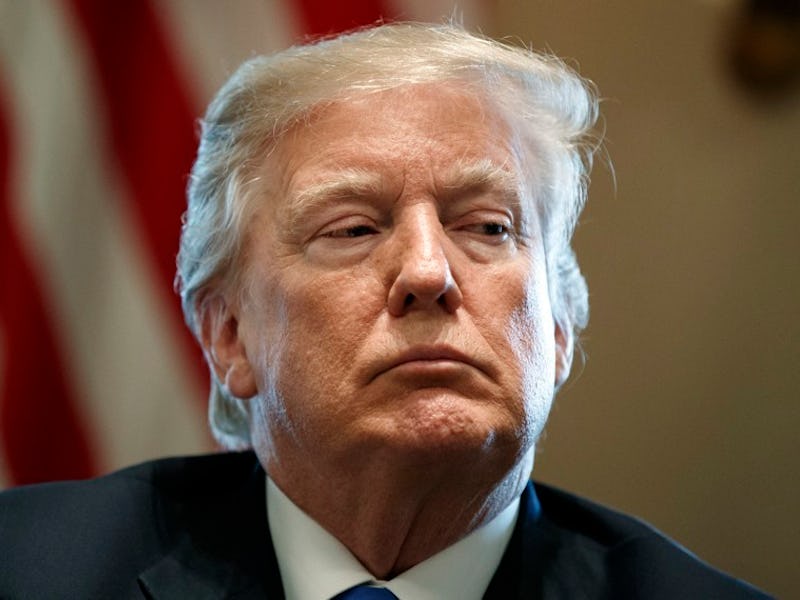Trump SAT Scores: Why the Internet's Burning Question Will Go Unanswered
But the verbal score tho!

We all knew that today’s prepared testimony from former Trump fixer Michael Cohen was bound to have some wild stuff. But in a transcript first obtained by the New York Times, there’s oooone piece of physical evidence that has everyone on Twitter muttering, “But the verbal score tho!”
The collective fixation on the relic of high school stress is thanks to a revelation from Cohen’s testimony where he says he was asked to send letters to Trump’s high school and college, as well as to the National College Board, “threatening” them not to release the president’s SAT scores. Why, exactly, the president cares so much about keeping his SAT scores a secret instantly became a flashpoint for speculation.
Why Everyone’s Talking About the SAT
It’s the second time in two days notions about Trumpian meritocracy have floated to the top of a categorically overwhelming news cycle. Just yesterday, Ivanka Trump was widely criticized over her rebuke to the New Green Deal’s job guarantee and universal basic income requirements, saying on Fox News, “I don’t think most Americans in their heart want to be given something. . . . People want to work for what they get.”
Critics were quick to point out that, as the daughter of a man perhaps most famous for telling everyone he’s a billionaire, Ivanka has enjoyed a lifetime of privilege and nepotism, a far cry from the meritocracy she has latched onto as an American ideal. And, given his desperate attempts at hiding his academic performance, it seems the president was reliant on some pretty gilded bootstraps as well.
As many of us know, at 13, Trump was sent to the New York Military Academy, where he graduated in 1964. He then enrolled at Fordham University for two years before transferring to the University of Pennsylvania’s Wharton School of Business, where he graduated in 1968 with a degree in economics. Today, Wharton is considered one of the top undergraduate business programs in the country, with an acceptance rate of 6.49%, and Trump has repeatedly referenced his time there. In a notable quote from a 2016 rally in Phoenix, he told the crowd, “I went to the Wharton School of Business,” according to The Guardian. “I’m, like, a really smart person.”
Now, to be fair, the SATs are hardly a beacon of meritocracy, and their status as an “unbiased” assessor of teenaged intelligence has been a point of contention for over a decade. Tutoring sessions? Your scores will be better. Access to practice tests? Your scores will be better. Instruction on test-taking strategy? Your scores will be better. Non-academic factors like household income and levels of parental education — even ethnicity — have been shown to influence how well a student does. For these reasons and more, it’s unusual to see a public official’s SAT scores emerge as a progressive line of attack.
Given all this, though, it honestly makes Trump’s insistence on hiding his SATs all the more intriguing. He was given so many steps up — like, so many — and yet, it would appear, he still fell short, academically. And now everybody, obviously, wants to, needs to, absolutely has to know: What the hell were Trump’s SAT scores?
How Confidential are SAT Scores, Really
The College Board, unsurprisingly, declined to comment on the matter, but their website does offer some guidelines about privacy.
Specifically, the Board recommends all colleges and universities refrain from putting SAT scores on transcripts to ensure they are in compliance with the Family Educational Rights and Privacy Act (FERPA), a 1974 law meant to protect student control over their personal and academic records. Social security numbers, parental addresses, birth places — all these qualify as “personally identifying information.”
But the definition of what constitutes “personal identifying information” isn’t clearly stated and, according to Stanley Tate, a St. Louis-based student loan lawyer who spoke briefly with Inverse for this story, SAT scores fall under the umbrella of protected records, too.
What that means is that, without written consent from a student — in this case, Trump — the College Board is unable to release SAT scores to the majority of third parties. Which means two things: This whole threatening letter debacle was, uh, absolutely unnecessary and, alas alack, we’ll probably never lay our eyes on that fated Scantron sheet.